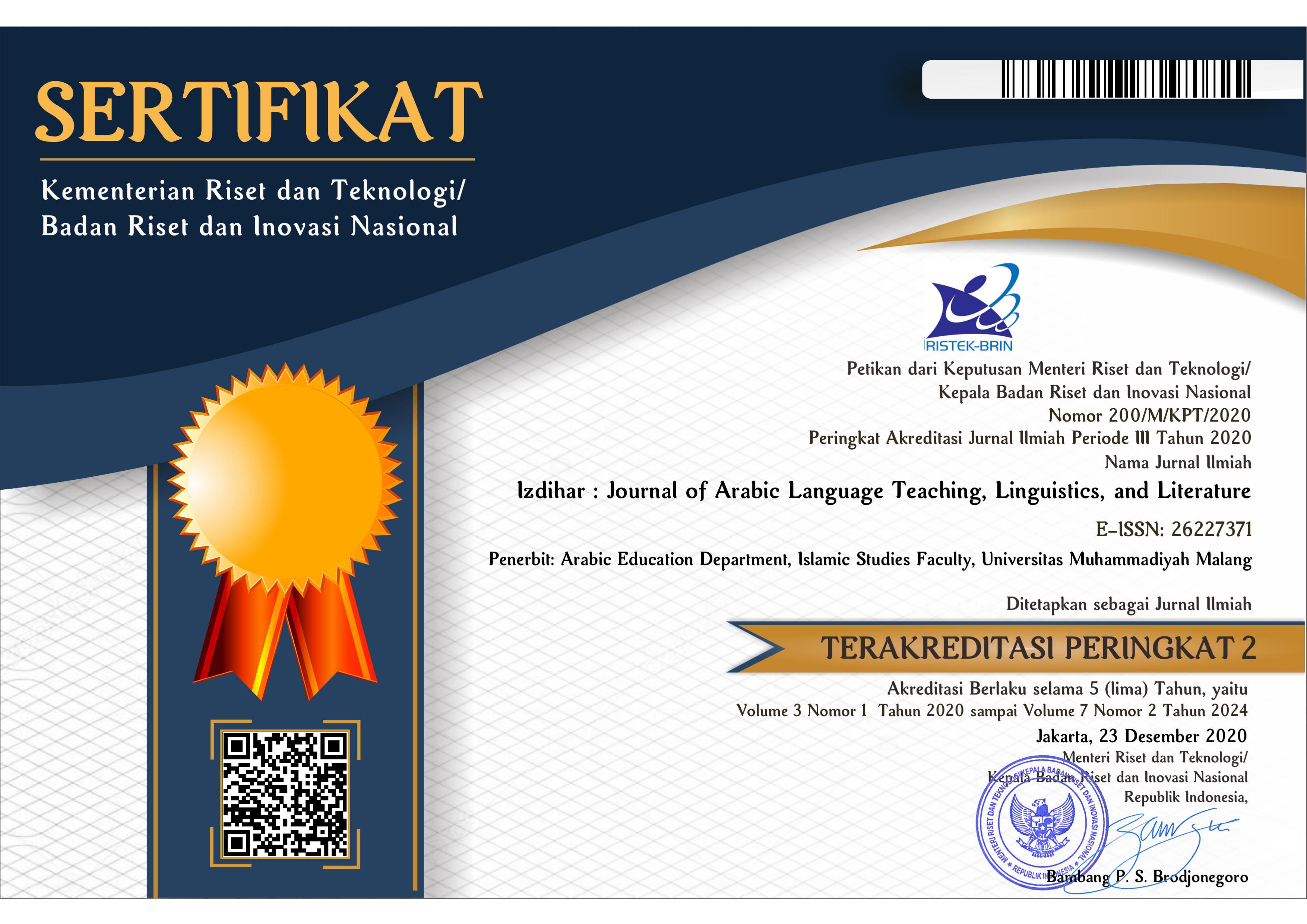Representative Speech Act in Arabic News Discourse: Study on Aljazeera and Al-Ahram
DOI:
https://doi.org/10.22219/jiz.v5i1.18161Keywords:
Arabic News Discourse, Covid-19, Pragmatics, Representative Speech ActAbstract
Covid-19 pandemic has caused many pros and cons which are mainly represented in the news in the mass media. Therefore, this study aims to observe how the mass media from Arab countries represent their position towards the Covid-19 pandemic through the news they release. In this study, the data is retrieved from Aljazeera and Al-Ahram. To find out their thoughts and opinions regarding the Covid-19 pandemic, the representative speech act framework presented by Yule (1996) and Searle (1979) is used. Meanwhile, the descriptive-analytical method on that news is relied, starting from providing data, classifying, analyzing, and presenting the results of the analysis. The result shows that there are four types of representative speech acts found in the Arabic news discourse, they are statement of fact, assertion, conclusion, and description. The writers represent their thoughts and opinions by choosing certain verbs or cognate objects, either agreeing or disputing some opinions, as well as citing various news sources or events that are considered valid and credible. Moreover, the comparison of the results from the two news sources did not show a significant difference because the language of these two newspapers is the Modern Standard Arabic (MSA).
Downloads
References
Abd al-Ghani, A.A. (2010). An-Nachwu al-Kāfī. Dar At-Taufiqiyyah li at-Turats
Alawi, Mahmud Zalaludin. (2013). Pragmatic analysis of representatives speech act in “Obama's speech to the United Nations General Assembly” Text (Doctoral dissertation, UIN Sunan Gunung Djati Bandung).
Ali, F. Q. (2018). Syntactic and semantic analysis of English and Arabic objects: A Contrastive Study. Al-Adab Journal, 2(126), 1-8. https://doi.org/10.31973/aj.v2i126.46
Ballmer, Th. & Brennenstuhl, W. (1981). Speech act classification: A study in the lexical analysis of English speech activity verbs. Springer. DOI: https://doi.org/10.1007/978-3-642-67758-8
Bangani, S. (2021). The fake news wave: Academic libraries' battle against misinformation during COVID-19. The Journal of Academic Librarianship, 47(5), 102390. https://doi.org/10.1016/j.acalib.2021.102390
Brown, K. & Miller, J. (2013). The Cambridge Dictionary of Linguistics. Cambridge University Press
Ebrahim, A. (2020). COVID-19 and socioeconomic impact in Africa. Available at: https://www.wider.unu.edu/sites/default/files/Publications/Background-note/PDF/bn2020-2-covid-19-socioeconomic-impact-south-africa.pdf (accessed 15 July 2021)
Eitelmann, M. & Mondorf, B. (2018). Cognate objects in language variation and change. In R. Finkbeiner & U. Freywald (Ed.), Exact Repetition in Grammar and Discourse (pp. 200-230). Berlin, Boston: De Gruyter Mouton. https://doi.org/10.1515/9783110592498-009
Faramida, I., Charlina, C., & Hermandra, H. (2019). Tindak tutur representatif pada caption instagram. Jurnal Tuah: Pendidikan dan Pengajaran Bahasa, 1(1), 8-17. http://dx.doi.org/10.31258/jtuah.1.1.p.8-17
Flowerdew, J. (1991). Pragmatic modifications on the ‘representative’speech act of defining. Journal of Pragmatics, 15(3), 253-264. https://doi.org/10.1016/0378-2166(91)90013-N
Al-Ghamdi, N. A. (2021). Ideological representation of fear and hope in online newspaper reports on COVID-19 in Saudi Arabia. Heliyon, 7(4), e06864. DOI: https://doi.org/10.1016/j.heliyon.2021.e06864
Glasdam, S., & Stjernswärd, S. (2020). Information about the COVID-19 pandemic–A thematic analysis of different ways of perceiving true and untrue information. Social Sciences & Humanities Open, 2(1), 100090. DOI: https://doi.org/10.1016/j.ssaho.2020.100090
Haroon, O., & Rizvi, S. A. R. (2020). COVID-19: Media coverage and financial markets behavior—A sectoral inquiry. Journal of Behavioral and Experimental Finance, 27, 100343. DOI: https://doi.org/10.1016/j.jbef.2020.100343
Ismail, M., & Harun, F. (2021). Modern standard Arabic online news discourse of men and women: Corpus-based analysis. Asian Journal Of Behavioural Sciences, 3(1), 24-39. Retrieved from: https://myjms.mohe.gov.my/index.php/ajbs/article/view/12507
Macfarland, Talke. (1995). Cognate objects and the argument/adjunct distinction in English. Northwestern University, PhD dissertation.
Madkhali, S. (2017). Cognate object constructions in MSA (Doctoral dissertation, University of Manchester).
Mahdi, R., & Lubis, A. A. (2020). Perspectives on the Arabic language from university student: Between reality and hope. Izdihar: Journal of Arabic Language Teaching, Linguistics, and Literature, 3(1), 45-58. DOI: https://doi.org/10.22219/jiz.v3i1.11757
Majeed, N. (2019). Data analysis and discussion the realization of the cognate object in the glorious Qur'an. Journal of Tikrit university for humanities, 24(1), 21-32. DOI: http://dx.doi.org/10.25130/hum.v24i1.186
Nugroho, S. A., Utari, P., & Rahmanto, A. N. (2020). Politics media: The dynamic of independency and neutrality for journalist in strengthening resilient society. In 6th International Conference on Social and Political Sciences (ICOSAPS 2020) (pp. 194-200). Atlantis Press. https://www.atlantis-press.com/article/125949739.pdf
Ogiermann, E., & Bella, S. (2021). On the dual role of expressive speech acts: Relational work on signs announcing closures during the Covid-19 pandemic. Journal of Pragmatics, 184, 1-17. https://doi.org/10.1016/j.pragma.2021.07.020
Orin, K., & Issy, Y. (2016). Representative speech acts performed by the debaters in an English debate competition. English Education Journal, 6(2), 76-86. https://journal.unnes.ac.id/sju/index.php/eej/article/view/13059
Proost, K. (2006). Speech act verbs, in Jacob L. Mey (ed.) (2009). Concise Encyclopedia of Pragmatics. 2nd Edition. Elsevier
Qadir, A., & Riloff, E. (2011, July). Classifying sentences as speech acts in message board posts. In Proceedings of the 2011 Conference on Empirical Methods in Natural Language Processing (pp. 748-758). https://www.aclweb.org/anthology/D11-1069.pdf
Quirk, Randolph. 1985. The English language in a global context. In Randolph Quirk & H G Widdowson (eds.), English in the world: Teaching and learning the language and literatures, 52-60. Cambridge University Press.
Riduan, E. (2021). The Concept of political communications in the digital era for a wider public service. In The 2nd International Conference And Call Paper 1(1). http://jurnal.unissula.ac.id/index.php/lics/article/view/13738
Ryding, K. C. (2005). A reference grammar of modern standard Arabic. Cambridge university press.
Safitri, N. U., & Fauzi, M. F. (2021). Arabic language representation in naming children: A case of shift naming of Melayu children. Izdihar: Journal of Arabic Language Teaching, Linguistics, and Literature, 4(1). DOI: https://doi.org/10.22219/jiz.v4i1.16144
Sciortino, R., & Saini, F. (2020). Towards a comprehensive narrative and response to COVID-19 in Southeast Asia. Social Sciences & Humanities Open, 2(1), 100058. https://doi.org/10.1016/j.ssaho.2020.100058
Searle, J.R. (1969). Speech acts: An essay in the philosophy of language. Cambridge University Press
Searle, J.R. (1979). Expression and meaning: Studies in the theory of speech act. Cambridge University Press
Sudaryanto (1988). Metode linguistik bagian kedua: Metode dan aneka teknik pengumpulan data. Gadjah Mada University Press
Sudaryanto (1993). Metode dan aneka teknik analisis bahasa. Duta Wacana University Press
Tsoumou, J. M. (2020). Analysing speech acts in politically related Facebook communication. Journal of Pragmatics, 167, 80-97. https://doi.org/10.1016/j.pragma.2020.06.004
Verschueren, Jef. (1980). On speech act verbs. John Benjamin B.V.
Al-Wahy, A. S. (2021). The influence of English on modern standard Arabic speech reporting styles: A corpus-based study. Lingua, 259, 103084. https://doi.org/10.1016/j.lingua.2021.103084
WHO (World Health Organisation). (2020). Coronavirus. Available at: https://www.who.int/health-topics/coronavirus#tab=tab_1 (15 July 2021).
Downloads
Published
How to Cite
Issue
Section
License
Copyright (c) 2022 Izdihar, Muhammad Lukman Arifianto, Hanik Mahliatussikah, Nur Anisah Ridwan, Ibnu Samsul Huda, Iqbal Fathi Izzudin, Nadia Fatchu Ilmi

This work is licensed under a Creative Commons Attribution-ShareAlike 4.0 International License.
Copyright Notice
Authors who publish with this journal agree to the following terms:
- Authors retain copyright and grant the journal right of first publication with the work simultaneously licensed under a Creative Commons Attribution-ShareAlike 4.0 International License that allows others to share the work with an acknowledgment of the work's authorship and initial publication in this journal.
- Authors are able to enter into separate, additional contractual arrangements for the non-exclusive distribution of the journal's published version of the work (e.g., post it to an institutional repository or publish it in a book), with an acknowledgment of its initial publication in this journal.
- Authors are permitted and encouraged to post their work online (e.g., in institutional repositories or on their website) prior to and during the submission process, as it can lead to productive exchanges, as well as earlier and greater citation of published work (See The Effect of Open Access).
Copyright (c) 2019 Izdihar : Journal of Arabic Language Teaching, Linguistics, and Literature

This work is licensed under a Creative Commons Attribution-ShareAlike 4.0 International License.

















